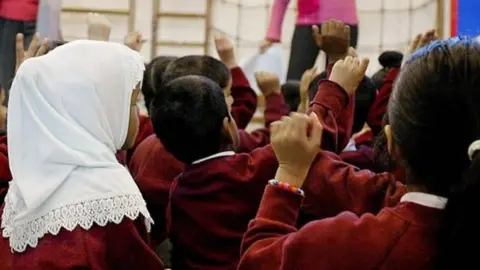Ofsted inspectors to quiz schoolgirls in hijabs
 Getty Images
Getty ImagesInspectors will question girls who wear hijab in primary school to find out why they do so, head of Ofsted Amanda Spielman has said.
She said creating an environment where Muslim children are expected to wear the headscarf "could be interpreted as sexualisation of young girls".
The hijab is traditionally worn as a sign of modesty once a girl reaches puberty.
But the Muslim Council of Britain said Ofsted's policy was "deeply worrying".
The announcement comes after Ms Spielman met campaigners from the Social Action and Research Foundation think tank on Friday.
In September, the foundation's head, Amina Lone, co-ordinated a letter to the Sunday Times from campaigners arguing that the hijab has "no place in our primary schools", and demanding action as Muslim girls as young as five were "increasingly veiled".
"This is an affront to the historical fight for gender equality in our secular democracy and is creating a two-tiered form of non-equality for young Muslim girls," the letter said.
Explaining her decision to act, Ms Spielman said: "While respecting parents' choice to bring up their children according to their cultural norms, creating an environment where primary school children are expected to wear the hijab could be interpreted as sexualisation of young girls.
"In seeking to address these concerns, and in line with our current practice in terms of assessing whether the school promotes equality for their children, inspectors will talk to girls who wear such garments to ascertain why they do so in the school."
She urged parents concerned about fundamentalist groups influencing school policy or breaching equality law to complain to the school or to Ofsted.
'Second-class citizens'
But Muslim Council of Britain secretary general Harun Khan said: "It is deeply worrying that Ofsted has announced it will be specifically targeting and quizzing young Muslim girls who choose to wear the headscarf.
"It sends a clear message to all British women who adopt this that they are second-class citizens, that while they are free to wear the headscarf, the establishment would prefer that they do not."
He said many British Muslims who wear the headscarf have done "extremely well" in education.
"It is disappointing that this is becoming policy without even engaging with a diverse set of mainstream Muslim voices on the topic," he said.
Mr Khan urged Ms Spielman to reverse the decision and said it risked being "counter-productive" to Ofsted's promise to uphold British values.
